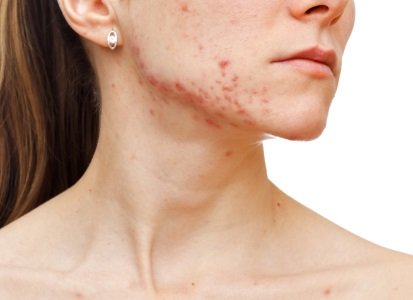No one has ever welcomed acne into their life, but it’s a common skin condition that affects people of all ages and genders. When pores become clogged with dead skin cells and sebum, a natural oil produced by the body, it leads to inflammation of the skin resulting in different stages of acne.
In this article, we will discuss the different stages of acne and explain how to manage it. We will also talk about how lifestyle changes and medical treatments can help to reduce the severity of acne.
Different Stages of Acne
The first stage of acne is known as whiteheads. These appear when a pore becomes clogged with dead skin cells, trapping them beneath the surface. Whiteheads can be small or large but are generally painless.
The second stage of acne is called blackheads. These occur when the clogged pores open and the sebum accumulates on the skin’s surface, oxidizing as it contacts air and forming a dark spot. Blackheads are usually small in size but can be painful if squeezed or picked at.
The third stage is acne papules which are small, red bumps that are often tender to the touch. Papules generally appear on the face, chest, and back, but can also be found on the neck, shoulders and other parts of the body.
The fourth stage is acne cysts which are fluid-filled lumps that can be painful if left untreated. Cysts form deep beneath the skin’s surface and often result in scarring if not treated properly. This type of acne is the most difficult to treat and can take months or even years to clear.
Now that we’ve discussed the different stages of acne, it’s important to understand how to manage it.
How to Reduce Acne
If your acne is stressing you out, some lifestyle changes may help. Here are a few tips you can try:
- Keep the skin clean and free of excess oil by washing twice a day with mild soap and water, using acne-fighting products that contain acne-fighting ingredients such as salicylic acid or benzoyl peroxide.
- Avoid popping or picking at acne which can lead to scarring and infection. This can also make acne worse.
- Eat a healthy, balanced diet and exercise regularly to help keep the skin free from acne-causing bacteria. When acne flare-ups do occur, keep the area clean and dry to help reduce inflammation.
- Limit your exposure to the sun as this can worsen acne and increase the risk of skin damage and even cancer.
Medical Treatments for Acne
If acne persists despite lifestyle changes, there are several medical acne treatments available. These include:
- Oral antibiotics- These can help to reduce inflammation and acne-causing bacteria.
- Topical treatments– Creams, gels, and ointments that contain acne-fighting ingredients such as benzoyl peroxide or retinoids can be applied directly to the skin to reduce acne symptoms.
- Hormonal therapy– For women, hormone therapy can help to reduce acne by balancing hormones and reducing sebum production.
- Laser treatments– These are usually used for severe acne, such as cysts, and involve targeting acne-causing bacteria with a laser beam. You may need several treatments to see results.
Acne can be a frustrating condition, but with the right lifestyle changes and medical treatments, it is possible to reduce acne symptoms and achieve clearer skin. If you’re struggling with acne, speak to your doctor or dermatologist about the best treatment for you.
When to seek professional acne treatment
If acne persists despite lifestyle changes and over-the-counter treatments, it is important to seek professional help. A dermatologist can provide specialized acne treatment tailored to your individual needs. They can also determine the best acne treatment for your skin type and provide advice on how to prevent acne flare-ups.
Acne is a common skin condition that can be managed with lifestyle changes and medical treatments. If you’re struggling with acne, don’t hesitate to seek professional help in order to achieve clearer, healthier skin.
With the right acne treatment, you can start feeling more confident and enjoy a healthier complexion. So don’t wait – get acne treatment today!































